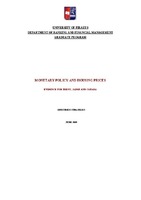Monetary policy and housing prices : evidence for the US, Japan and Canada

Master Thesis
Συγγραφέας
Στρατηγός, Δημήτριος
Ημερομηνία
2009-09-14Προβολή/
Θεματική επικεφαλίδα
Monetary policy ; Housing -- Prices -- Econometric modelsΠερίληψη
This paper explores both theoretically and empirically the links between house prices, equity prices , inflation, interest rates and economic activity, focusing mainly on the relationship between interest rates and real house prices, in three industrialized countries, namely the USA, Canada and Japan, over the last thirty years. In all three countries, Granger causality tests indicate that there is evidence of a significant bidirectional link between nominal short-term interest rates and the growth rate of real house prices. Analysis via impulse responses verified the expected cumulative response of the one variable to a shock in the other variable. Particularly after an interest rate shock, the growth rate of real house prices falls, with the duration of the effect varying from four quarters (USA) to twelve quarters (Canada). After a shock in the growth rate of real house prices, interest rates rise with the duration of the effect varying from six quarters (Canada) to eleven quarters (Japan). Finally, empirical evidence suggests that monetary authorities should be concentrated on targeting inflation and short run economic stability and that house prices should affect monetary policy only to the extent that they affect the inflation forecast of a central bank.


